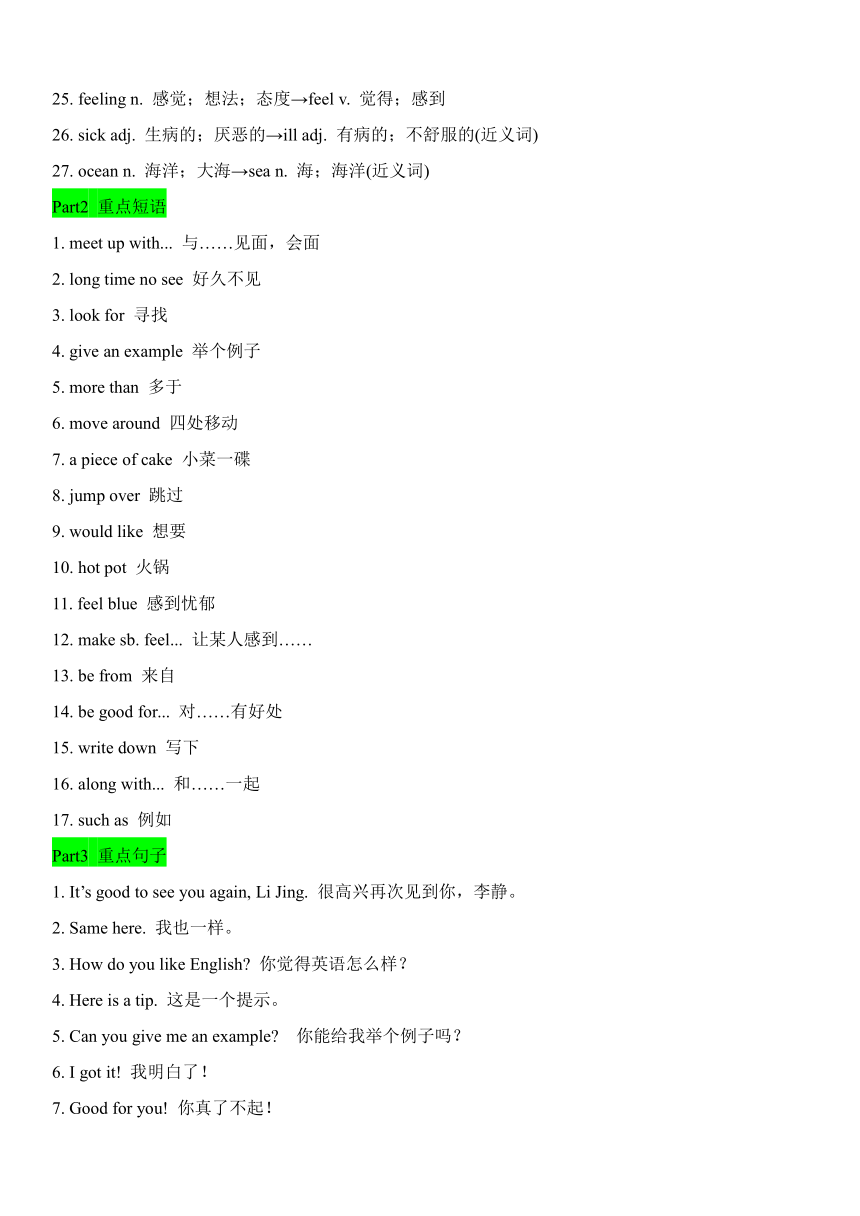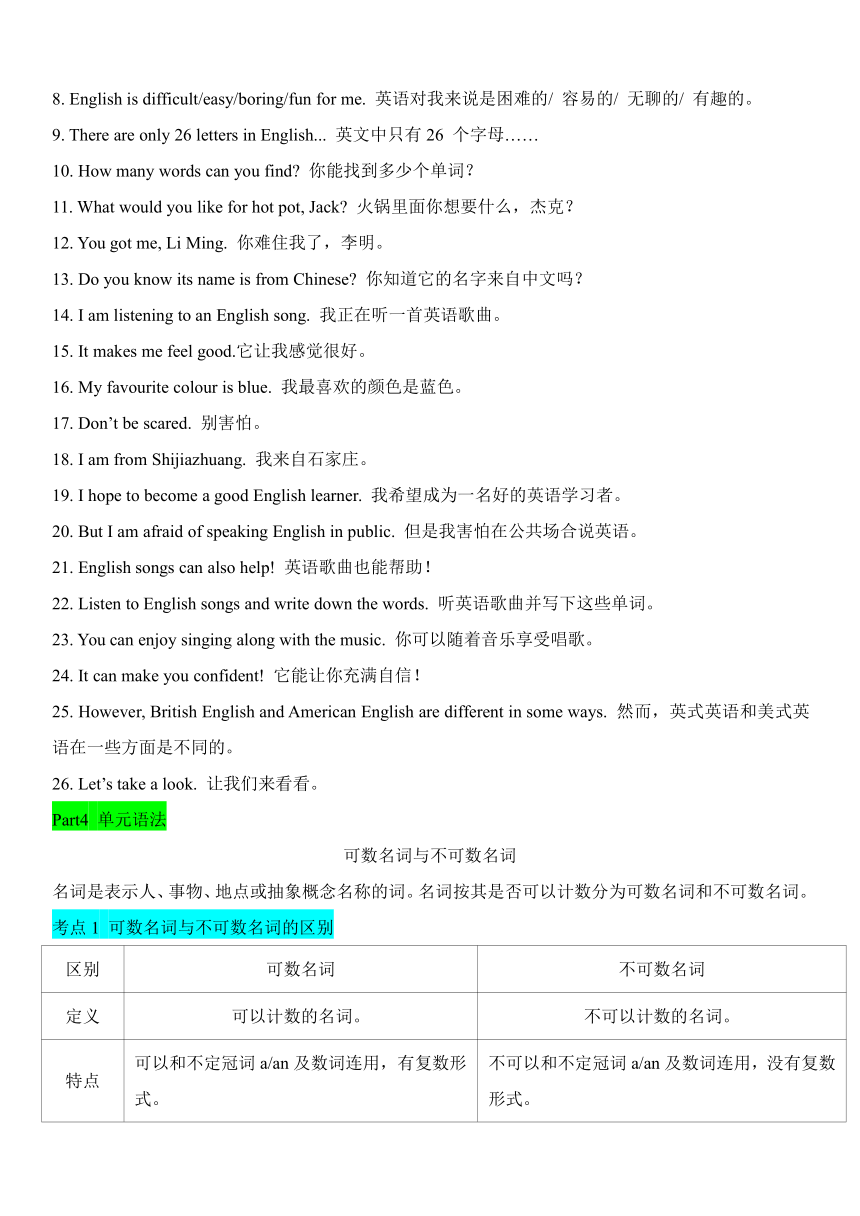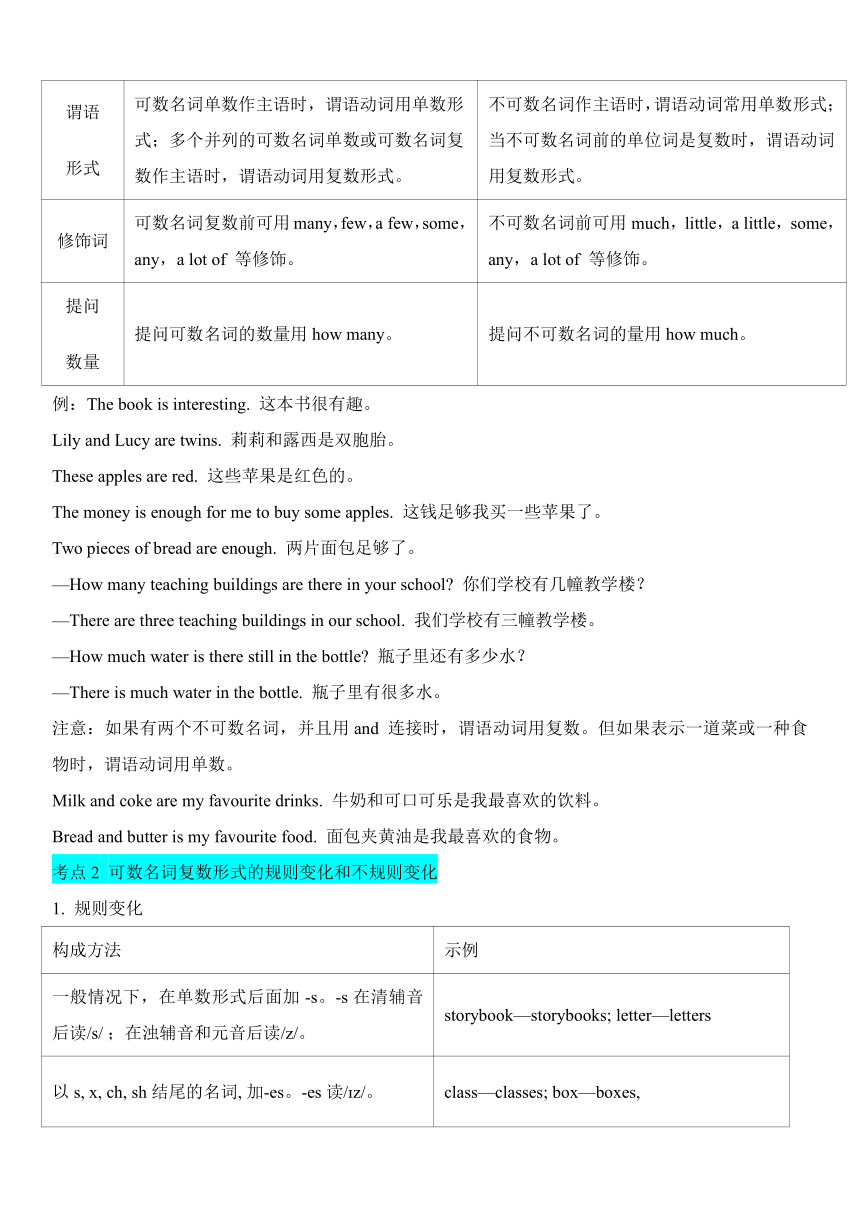Unit 2 Learning English is fun讲义冀教版(2024)英语七年级上册
文档属性
| 名称 | Unit 2 Learning English is fun讲义冀教版(2024)英语七年级上册 |  | |
| 格式 | docx | ||
| 文件大小 | 26.9KB | ||
| 资源类型 | 教案 | ||
| 版本资源 | 冀教版 | ||
| 科目 | 英语 | ||
| 更新时间 | 2025-07-21 08:51:03 | ||
图片预览




文档简介
Unit 2 Learning English is fun!
Part1 重点单词
1. amazing adj. 令人惊奇的(修饰物)→amazed adj. 大为惊奇的(形容人的感受)
2. true adj. 确实的; 真正的→truly adv. 真诚地;真正地
3. example n. 例子;典型→set an example for/to... 为……树立榜样→take...as an example 以……为例→for example 例如→give an example 举个例子→for example 例如→such as 例如
4. meaning n. 意义;含义→the meaning of ……的意思
5. mean v. 意思是;意味着 →adj. 吝啬的;小气的
6. more det. & pron. 更多的adv. 更;更多→many 和much 的比较级
7. only adv. 只有;仅仅adj. 唯一的;仅有的→not only... but also... 不仅……而且……
8. than prep. & conj. 比
9. level n. 水平;标准;级别 →sea level 海平面
10. even adv. 甚至
11. need v. & n. 需要;必需→need sth./sb. 需要某物/ 某人→need to do sth. 需要做某事→need sb. to do sth. 需要某人做某事
12. piece n. 片;碎片;一件→a piece of / two pieces of 一块/ 两块
13. sentence n. 句子
14. quick adj. 快的;迅速的→quickly adv. 迅速地;立即
15. fox n. 狐狸 foxes(复数)
16. lazy adj. 懒惰的→lazily adv. 懒散地;慢吞吞地
17. fact n. 事实;现实→in fact 实际上;事实上
18. would aux. 愿意→will 的过去式
19. pot n. 锅
20. cabbage n. 卷心菜;洋白菜
21. maybe adv. 大概,也许,可能→may be 可能是;也许是→probably、perhaps(近义词)
22. tofu n. 豆腐
23. correct adj. 正确的;合适的→right adj. 正确的(近义词)→wrong adj. 错误的(反义词)→correctly adv. 正确地;得体地
24. line n. 歌词;字行;线;路线
25. feeling n. 感觉;想法;态度→feel v. 觉得;感到
26. sick adj. 生病的;厌恶的→ill adj. 有病的;不舒服的(近义词)
27. ocean n. 海洋;大海→sea n. 海;海洋(近义词)
Part2 重点短语
1. meet up with... 与……见面,会面
2. long time no see 好久不见
3. look for 寻找
4. give an example 举个例子
5. more than 多于
6. move around 四处移动
7. a piece of cake 小菜一碟
8. jump over 跳过
9. would like 想要
10. hot pot 火锅
11. feel blue 感到忧郁
12. make sb. feel... 让某人感到……
13. be from 来自
14. be good for... 对……有好处
15. write down 写下
16. along with... 和……一起
17. such as 例如
Part3 重点句子
1. It’s good to see you again, Li Jing. 很高兴再次见到你,李静。
2. Same here. 我也一样。
3. How do you like English 你觉得英语怎么样?
4. Here is a tip. 这是一个提示。
5. Can you give me an example 你能给我举个例子吗?
6. I got it! 我明白了!
7. Good for you! 你真了不起!
8. English is difficult/easy/boring/fun for me. 英语对我来说是困难的/ 容易的/ 无聊的/ 有趣的。
9. There are only 26 letters in English... 英文中只有26 个字母……
10. How many words can you find 你能找到多少个单词?
11. What would you like for hot pot, Jack 火锅里面你想要什么,杰克?
12. You got me, Li Ming. 你难住我了,李明。
13. Do you know its name is from Chinese 你知道它的名字来自中文吗?
14. I am listening to an English song. 我正在听一首英语歌曲。
15. It makes me feel good.它让我感觉很好。
16. My favourite colour is blue. 我最喜欢的颜色是蓝色。
17. Don’t be scared. 别害怕。
18. I am from Shijiazhuang. 我来自石家庄。
19. I hope to become a good English learner. 我希望成为一名好的英语学习者。
20. But I am afraid of speaking English in public. 但是我害怕在公共场合说英语。
21. English songs can also help! 英语歌曲也能帮助!
22. Listen to English songs and write down the words. 听英语歌曲并写下这些单词。
23. You can enjoy singing along with the music. 你可以随着音乐享受唱歌。
24. It can make you confident! 它能让你充满自信!
25. However, British English and American English are different in some ways. 然而,英式英语和美式英语在一些方面是不同的。
26. Let’s take a look. 让我们来看看。
Part4 单元语法
可数名词与不可数名词
名词是表示人、事物、地点或抽象概念名称的词。名词按其是否可以计数分为可数名词和不可数名词。
考点1 可数名词与不可数名词的区别
区别 可数名词 不可数名词
定义 可以计数的名词。 不可以计数的名词。
特点 可以和不定冠词a/an 及数词连用,有复数形式。 不可以和不定冠词a/an 及数词连用,没有复数形式。
谓语 形式 可数名词单数作主语时,谓语动词用单数形式;多个并列的可数名词单数或可数名词复数作主语时,谓语动词用复数形式。 不可数名词作主语时,谓语动词常用单数形式;当不可数名词前的单位词是复数时,谓语动词用复数形式。
修饰词 可数名词复数前可用many,few,a few,some,any,a lot of 等修饰。 不可数名词前可用much,little,a little,some,any,a lot of 等修饰。
提问 数量 提问可数名词的数量用how many。 提问不可数名词的量用how much。
例:The book is interesting. 这本书很有趣。
Lily and Lucy are twins. 莉莉和露西是双胞胎。
These apples are red. 这些苹果是红色的。
The money is enough for me to buy some apples. 这钱足够我买一些苹果了。
Two pieces of bread are enough. 两片面包足够了。
—How many teaching buildings are there in your school 你们学校有几幢教学楼?
—There are three teaching buildings in our school. 我们学校有三幢教学楼。
—How much water is there still in the bottle 瓶子里还有多少水?
—There is much water in the bottle. 瓶子里有很多水。
注意:如果有两个不可数名词,并且用and 连接时,谓语动词用复数。但如果表示一道菜或一种食物时,谓语动词用单数。
Milk and coke are my favourite drinks. 牛奶和可口可乐是我最喜欢的饮料。
Bread and butter is my favourite food. 面包夹黄油是我最喜欢的食物。
考点2 可数名词复数形式的规则变化和不规则变化
1. 规则变化
构成方法 示例
一般情况下,在单数形式后面加 -s。-s 在清辅音后读/s/ ;在浊辅音和元音后读/z/。 storybook—storybooks; letter—letters
以s, x, ch, sh 结尾的名词, 加-es。-es 读/ z/。 class—classes; box—boxes, watch—watches; wish—wishes
以元音字母加y 结尾的名词,直接在词尾加-s。-s 读/z/。 boy—boys; monkey—monkeys
以辅音字母加y 结尾的名词,将-y 改为-i,然后加-es。-es读/ z/。 country—countries; city—cities
以o 结尾的,有的加-s,有的加-es。-s 和-es 读/z/。 radio—radios; photo—photos; tomato—tomatoes; potato—potatoes
以f, fe 结尾的名词,去掉-f 或-fe,加-ves。-ves 读/vz/。 thief—thieves; wife—wives
记忆口诀 常见的以f 或fe 结尾的名词
小偷(thief)之妻(wife)生活(life)难,
自己(self)扫叶(leaf)来做饭。
忽见一狼(wolf)躲架(shelf)后,
取刀(knife)把它劈两半(half)。
2. 少数可数名词复数形式的变化是不规则的,常见的变化如下:
类别 例词
词尾发生变化 child→children
改变词中的元音字母 man-men;woman→women;foot→feet;tooth→teeth
单复数同形 sheep→sheep;Chinese→Chinese;deer→deer
记忆口诀 可数名词单数变复数的口诀
名词单数变复数,多数直接加-s。
词尾若是s,x,sh,ch,直接加上-es。
词尾若是f 或fe,先变f 或fe 为v,再加-es。
若见“辅音字母+y”,把y 变i 再加-es。
词尾字母若是o,变复数时有两种,
无生命的加-s,有生命的加-es。
oo 常要变ee,foot—feet 是一例;
男人女人a 变e,man—men 又一例。
child 复数children,特殊变化特殊记。
中国人Chinese,日本人Japanese。
还有绵羊sheep、鹿deer 和金鱼goldfish,
单数复数均自己。
考点3 不可数名词的量化表达
结构:数词 + 量词(普通名词)+ of + 不可数名词,复数变化体现在量词上。常用量词:a piece of(一片/ 张)、a cup of(一杯)、a glass of(一玻璃杯)、a bottle of(一瓶)等。
例:The children drank three cups of water after exercise.孩子们在运动后喝了三杯水。
I need two bottles of juice for the picnic.我需要两瓶果汁去野餐。
考点4 有些名词既可作可数名词又可作不可数名词,但词义不同
名词 orange fish chicken exercise glass
不可数 橙汁 鱼肉 鸡肉 锻炼 玻璃
可数 橙子 鱼 鸡 训练活动、练习 玻璃杯
名词 light room time wood experience work
不可数 光 空间 时间 木材 经验 工作
可数 电灯 房间 次数 树林 (一次) 经历 作品、著作
Part5 单元写作
谈论英语学习
1.写作话题
本单元的话题是“英语学习”,相关的写作通常涉及几个方面:(1)介绍学习方法及选择的理由(2)针对他人在学习中遇到的困难给出学习方法
2.写作模板
谈论英语学习 综述对英语的认识和感受
介绍具体的学习方法
表达学习感受和期望
3.积累好句
开头段
① English is very important in our life.
② Learning English makes us know more about the world.
③ I like English and want to improve it.
中间段
① First, we can learn English words every day.
② Listening to English songs is fun and helpful.
③ Watching English cartoons helps us practice listening.
④ Speaking English with friends makes it easier.
⑤ Reading short English stories is also good.
⑥ Writing a few English sentences every day is useful.
⑦ Don’t be shy—just try your best!
结尾段
① English learning needs time and practice.
② If we keep trying, we will get better.
③ Let’s enjoy learning English together!
4.经典例题
英语不仅仅是一门学科,更是一种工具。学会英语不仅能很好地与他人交流,而且能够丰富我们的知识。请以“How to Learn English Well”为题,根据下面的提示,写一篇80 词左右的英文短文。
提示:1. Why do we learn English
2. What should we do to learn English well in class
3. What should we do to learn English well after class
How to Learn English Well
__________________________________________________________________________________________________________________________________________________________________________________________________________________________________________________________________________________________________________________________________________________________________________________________________________________________________________________________________________________________________________________________________________
必背范文
How to Learn English Well
English is an important language. It can help us open the door to the world. But how do we learn English well
Firstly, I think we should listen to the teacher carefully and take notes in class. We should speak English as much as we can.
Don’t be afraid to make mistakes! Don’t be afraid to make mistakes. Secondly, we can read some English books after class. Last, try to listen to English songs and watch English films.
I’m sure we can learn English well in those ways.
5.实战演练
亲爱的同学,你在英语学习方面一定有很多经验和体会,请你结合以下提示,以 “How to Learn English”为题写一篇英文短文,把你的英语学习经验介绍给你的同学们。
提示:1. Why should we learn English
2 . W hat is your advice on learning English
__________________________________________________________________________________________________________________________________________________________________________________________________________________________________________________________________________________________________________________________________________________________________________________________________________________________________________________________________________________________________________________________________________
参考范文:
How to Learn English
English is widely used in the world. So learning English well will be helpful for us. How can we learn it well Here are my tips.
First, we should often listen to English songs and watch English movies. Second, we should speak English in class as much as possible. Don’t be afraid of making mistakes. Third, we should read more English newspapers and magazines. It’s good for us. Last, we should keep a diary in English.
In a word, as long as we do more listening, speaking, reading and writing, we will learn English well.
Part1 重点单词
1. amazing adj. 令人惊奇的(修饰物)→amazed adj. 大为惊奇的(形容人的感受)
2. true adj. 确实的; 真正的→truly adv. 真诚地;真正地
3. example n. 例子;典型→set an example for/to... 为……树立榜样→take...as an example 以……为例→for example 例如→give an example 举个例子→for example 例如→such as 例如
4. meaning n. 意义;含义→the meaning of ……的意思
5. mean v. 意思是;意味着 →adj. 吝啬的;小气的
6. more det. & pron. 更多的adv. 更;更多→many 和much 的比较级
7. only adv. 只有;仅仅adj. 唯一的;仅有的→not only... but also... 不仅……而且……
8. than prep. & conj. 比
9. level n. 水平;标准;级别 →sea level 海平面
10. even adv. 甚至
11. need v. & n. 需要;必需→need sth./sb. 需要某物/ 某人→need to do sth. 需要做某事→need sb. to do sth. 需要某人做某事
12. piece n. 片;碎片;一件→a piece of / two pieces of 一块/ 两块
13. sentence n. 句子
14. quick adj. 快的;迅速的→quickly adv. 迅速地;立即
15. fox n. 狐狸 foxes(复数)
16. lazy adj. 懒惰的→lazily adv. 懒散地;慢吞吞地
17. fact n. 事实;现实→in fact 实际上;事实上
18. would aux. 愿意→will 的过去式
19. pot n. 锅
20. cabbage n. 卷心菜;洋白菜
21. maybe adv. 大概,也许,可能→may be 可能是;也许是→probably、perhaps(近义词)
22. tofu n. 豆腐
23. correct adj. 正确的;合适的→right adj. 正确的(近义词)→wrong adj. 错误的(反义词)→correctly adv. 正确地;得体地
24. line n. 歌词;字行;线;路线
25. feeling n. 感觉;想法;态度→feel v. 觉得;感到
26. sick adj. 生病的;厌恶的→ill adj. 有病的;不舒服的(近义词)
27. ocean n. 海洋;大海→sea n. 海;海洋(近义词)
Part2 重点短语
1. meet up with... 与……见面,会面
2. long time no see 好久不见
3. look for 寻找
4. give an example 举个例子
5. more than 多于
6. move around 四处移动
7. a piece of cake 小菜一碟
8. jump over 跳过
9. would like 想要
10. hot pot 火锅
11. feel blue 感到忧郁
12. make sb. feel... 让某人感到……
13. be from 来自
14. be good for... 对……有好处
15. write down 写下
16. along with... 和……一起
17. such as 例如
Part3 重点句子
1. It’s good to see you again, Li Jing. 很高兴再次见到你,李静。
2. Same here. 我也一样。
3. How do you like English 你觉得英语怎么样?
4. Here is a tip. 这是一个提示。
5. Can you give me an example 你能给我举个例子吗?
6. I got it! 我明白了!
7. Good for you! 你真了不起!
8. English is difficult/easy/boring/fun for me. 英语对我来说是困难的/ 容易的/ 无聊的/ 有趣的。
9. There are only 26 letters in English... 英文中只有26 个字母……
10. How many words can you find 你能找到多少个单词?
11. What would you like for hot pot, Jack 火锅里面你想要什么,杰克?
12. You got me, Li Ming. 你难住我了,李明。
13. Do you know its name is from Chinese 你知道它的名字来自中文吗?
14. I am listening to an English song. 我正在听一首英语歌曲。
15. It makes me feel good.它让我感觉很好。
16. My favourite colour is blue. 我最喜欢的颜色是蓝色。
17. Don’t be scared. 别害怕。
18. I am from Shijiazhuang. 我来自石家庄。
19. I hope to become a good English learner. 我希望成为一名好的英语学习者。
20. But I am afraid of speaking English in public. 但是我害怕在公共场合说英语。
21. English songs can also help! 英语歌曲也能帮助!
22. Listen to English songs and write down the words. 听英语歌曲并写下这些单词。
23. You can enjoy singing along with the music. 你可以随着音乐享受唱歌。
24. It can make you confident! 它能让你充满自信!
25. However, British English and American English are different in some ways. 然而,英式英语和美式英语在一些方面是不同的。
26. Let’s take a look. 让我们来看看。
Part4 单元语法
可数名词与不可数名词
名词是表示人、事物、地点或抽象概念名称的词。名词按其是否可以计数分为可数名词和不可数名词。
考点1 可数名词与不可数名词的区别
区别 可数名词 不可数名词
定义 可以计数的名词。 不可以计数的名词。
特点 可以和不定冠词a/an 及数词连用,有复数形式。 不可以和不定冠词a/an 及数词连用,没有复数形式。
谓语 形式 可数名词单数作主语时,谓语动词用单数形式;多个并列的可数名词单数或可数名词复数作主语时,谓语动词用复数形式。 不可数名词作主语时,谓语动词常用单数形式;当不可数名词前的单位词是复数时,谓语动词用复数形式。
修饰词 可数名词复数前可用many,few,a few,some,any,a lot of 等修饰。 不可数名词前可用much,little,a little,some,any,a lot of 等修饰。
提问 数量 提问可数名词的数量用how many。 提问不可数名词的量用how much。
例:The book is interesting. 这本书很有趣。
Lily and Lucy are twins. 莉莉和露西是双胞胎。
These apples are red. 这些苹果是红色的。
The money is enough for me to buy some apples. 这钱足够我买一些苹果了。
Two pieces of bread are enough. 两片面包足够了。
—How many teaching buildings are there in your school 你们学校有几幢教学楼?
—There are three teaching buildings in our school. 我们学校有三幢教学楼。
—How much water is there still in the bottle 瓶子里还有多少水?
—There is much water in the bottle. 瓶子里有很多水。
注意:如果有两个不可数名词,并且用and 连接时,谓语动词用复数。但如果表示一道菜或一种食物时,谓语动词用单数。
Milk and coke are my favourite drinks. 牛奶和可口可乐是我最喜欢的饮料。
Bread and butter is my favourite food. 面包夹黄油是我最喜欢的食物。
考点2 可数名词复数形式的规则变化和不规则变化
1. 规则变化
构成方法 示例
一般情况下,在单数形式后面加 -s。-s 在清辅音后读/s/ ;在浊辅音和元音后读/z/。 storybook—storybooks; letter—letters
以s, x, ch, sh 结尾的名词, 加-es。-es 读/ z/。 class—classes; box—boxes, watch—watches; wish—wishes
以元音字母加y 结尾的名词,直接在词尾加-s。-s 读/z/。 boy—boys; monkey—monkeys
以辅音字母加y 结尾的名词,将-y 改为-i,然后加-es。-es读/ z/。 country—countries; city—cities
以o 结尾的,有的加-s,有的加-es。-s 和-es 读/z/。 radio—radios; photo—photos; tomato—tomatoes; potato—potatoes
以f, fe 结尾的名词,去掉-f 或-fe,加-ves。-ves 读/vz/。 thief—thieves; wife—wives
记忆口诀 常见的以f 或fe 结尾的名词
小偷(thief)之妻(wife)生活(life)难,
自己(self)扫叶(leaf)来做饭。
忽见一狼(wolf)躲架(shelf)后,
取刀(knife)把它劈两半(half)。
2. 少数可数名词复数形式的变化是不规则的,常见的变化如下:
类别 例词
词尾发生变化 child→children
改变词中的元音字母 man-men;woman→women;foot→feet;tooth→teeth
单复数同形 sheep→sheep;Chinese→Chinese;deer→deer
记忆口诀 可数名词单数变复数的口诀
名词单数变复数,多数直接加-s。
词尾若是s,x,sh,ch,直接加上-es。
词尾若是f 或fe,先变f 或fe 为v,再加-es。
若见“辅音字母+y”,把y 变i 再加-es。
词尾字母若是o,变复数时有两种,
无生命的加-s,有生命的加-es。
oo 常要变ee,foot—feet 是一例;
男人女人a 变e,man—men 又一例。
child 复数children,特殊变化特殊记。
中国人Chinese,日本人Japanese。
还有绵羊sheep、鹿deer 和金鱼goldfish,
单数复数均自己。
考点3 不可数名词的量化表达
结构:数词 + 量词(普通名词)+ of + 不可数名词,复数变化体现在量词上。常用量词:a piece of(一片/ 张)、a cup of(一杯)、a glass of(一玻璃杯)、a bottle of(一瓶)等。
例:The children drank three cups of water after exercise.孩子们在运动后喝了三杯水。
I need two bottles of juice for the picnic.我需要两瓶果汁去野餐。
考点4 有些名词既可作可数名词又可作不可数名词,但词义不同
名词 orange fish chicken exercise glass
不可数 橙汁 鱼肉 鸡肉 锻炼 玻璃
可数 橙子 鱼 鸡 训练活动、练习 玻璃杯
名词 light room time wood experience work
不可数 光 空间 时间 木材 经验 工作
可数 电灯 房间 次数 树林 (一次) 经历 作品、著作
Part5 单元写作
谈论英语学习
1.写作话题
本单元的话题是“英语学习”,相关的写作通常涉及几个方面:(1)介绍学习方法及选择的理由(2)针对他人在学习中遇到的困难给出学习方法
2.写作模板
谈论英语学习 综述对英语的认识和感受
介绍具体的学习方法
表达学习感受和期望
3.积累好句
开头段
① English is very important in our life.
② Learning English makes us know more about the world.
③ I like English and want to improve it.
中间段
① First, we can learn English words every day.
② Listening to English songs is fun and helpful.
③ Watching English cartoons helps us practice listening.
④ Speaking English with friends makes it easier.
⑤ Reading short English stories is also good.
⑥ Writing a few English sentences every day is useful.
⑦ Don’t be shy—just try your best!
结尾段
① English learning needs time and practice.
② If we keep trying, we will get better.
③ Let’s enjoy learning English together!
4.经典例题
英语不仅仅是一门学科,更是一种工具。学会英语不仅能很好地与他人交流,而且能够丰富我们的知识。请以“How to Learn English Well”为题,根据下面的提示,写一篇80 词左右的英文短文。
提示:1. Why do we learn English
2. What should we do to learn English well in class
3. What should we do to learn English well after class
How to Learn English Well
__________________________________________________________________________________________________________________________________________________________________________________________________________________________________________________________________________________________________________________________________________________________________________________________________________________________________________________________________________________________________________________________________________
必背范文
How to Learn English Well
English is an important language. It can help us open the door to the world. But how do we learn English well
Firstly, I think we should listen to the teacher carefully and take notes in class. We should speak English as much as we can.
Don’t be afraid to make mistakes! Don’t be afraid to make mistakes. Secondly, we can read some English books after class. Last, try to listen to English songs and watch English films.
I’m sure we can learn English well in those ways.
5.实战演练
亲爱的同学,你在英语学习方面一定有很多经验和体会,请你结合以下提示,以 “How to Learn English”为题写一篇英文短文,把你的英语学习经验介绍给你的同学们。
提示:1. Why should we learn English
2 . W hat is your advice on learning English
__________________________________________________________________________________________________________________________________________________________________________________________________________________________________________________________________________________________________________________________________________________________________________________________________________________________________________________________________________________________________________________________________________
参考范文:
How to Learn English
English is widely used in the world. So learning English well will be helpful for us. How can we learn it well Here are my tips.
First, we should often listen to English songs and watch English movies. Second, we should speak English in class as much as possible. Don’t be afraid of making mistakes. Third, we should read more English newspapers and magazines. It’s good for us. Last, we should keep a diary in English.
In a word, as long as we do more listening, speaking, reading and writing, we will learn English well.
同课章节目录
